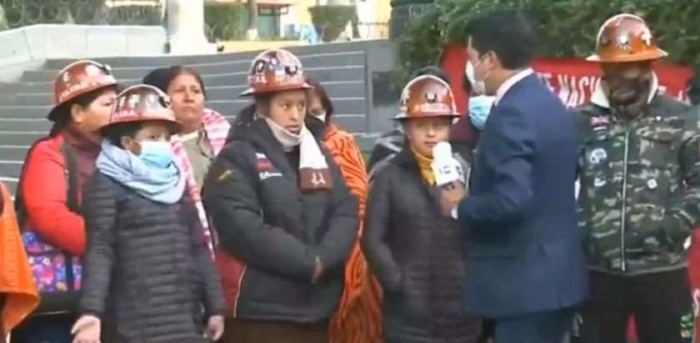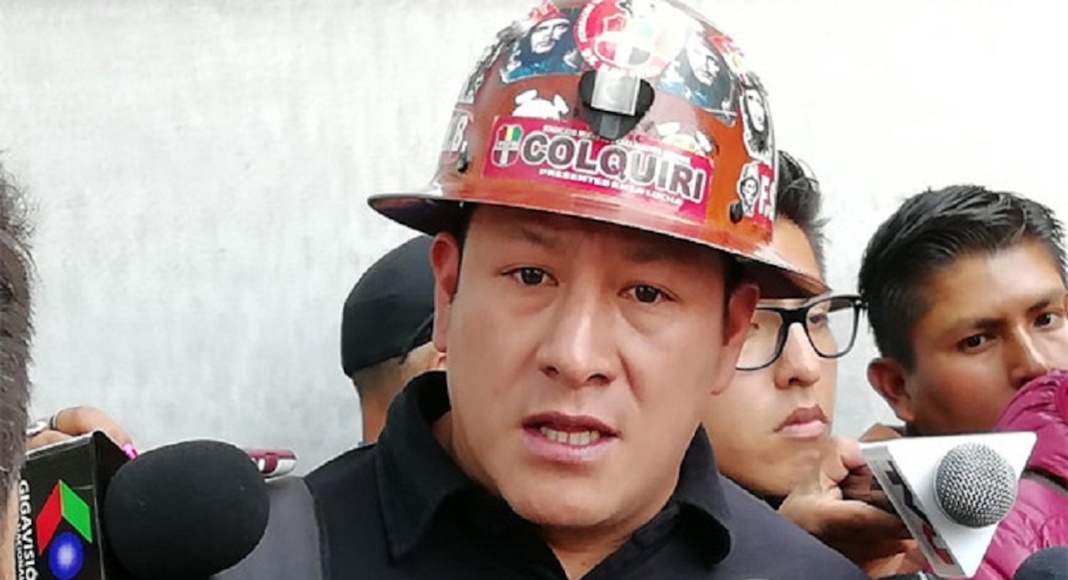The 36-year-old miners’ leader, tipped to become Minister of Mining in the new MAS government, died on 28 October. At first it was widely believed that he had been attacked by right-wing opponents of MAS, but the circumstances are far from clear, and even his own union, the FSTMB, has said that it must wait for the findings of the investigation.
It is with sadness that LAB reports on the death of Orlando Gutiérrez, the young leader of the Bolivian Mineworkers Union (FSTMB). Gutiérrez died in hospital on 28 October last year from injuries sustained in circumstances which have yet to be clarified. He was just 36, married, and the father of two twin girls.
At the time of his death, it was widely reported that Gutiérrez had been the victim of a far-right street gang disgruntled with the landslide election victory of Luis Arce and the Movement Towards Socialism (MAS). A prominent MAS supporter, Gutiérrez and his family had been subject to frequent death threats posted on social media. He had also complained of threats and harassment from sections of the state apparatus, even appealing to the Inter-American Commission on Human Rights for protection, according to his lawyer.
Gutiérrez’s profile rose in August last year as he led demonstrations and roadblocks to demand that the illegitimate regime led by Jeanine Áñez set a date for fresh elections and stick to it. The government had postponed twice, supposedly due to the Covid-19 pandemic, but eventually political pressure forced them to honour the date set for 18 October.
Gutiérrez had even been tipped for a cabinet post in the incoming Arce administration, perhaps as minister of work or mining.
The expansion of para-state groups
The hypothesis that Gutiérrez had been attacked by the far right was widely circulated in the aftermath of his hospitalisation, including by the union he led.
‘This serious attack was carried out as a form of revenge by the fascist right, the so-called pititas’, said the FSTMB in a statement (Pitita is a colloquial term referring to the largely middle-class demonstrators and digital activists whose street protests contributed to the ousting of Evo Morales in November 2019. First used pejoratively by Morales, the name was subsequently adopted by the protestors as a badge of honour).
Of course, not all of those who opposed Morales did so violently. But it is true that violent, far-right street gangs and para-state groups did proliferate and expand in Bolivia around the time of the 2019 political crisis and during the year-long Áñez regime. MAS rallies and other anti-government demonstrations were sometimes violently repressed by far-right groups, often with the complicity or indeed the active involvement of state security forces.
Such groups include the Santa Cruz Youth Union (UJC), often considered the armed branch of the Pro Santa Cruz Civic Committee (CCPSC), a powerful coalition of business groups, landowners and neighbourhood associations which has long concerted the anti-MAS and separatist sentiment in the eastern department of Santa Cruz.
The UJC, who make little secret of their admiration for European fascism, have a long history of violence towards pro-MAS individuals and organisations including students, journalists and campesinos.
A newer group, which emerged following the disputed elections in 2019, is the Cochabamba Youth Resistance (RJC). Founded by seven young people united by their visceral hatred of Evo Morales, it quickly expanded and now has as many as 5000 members. RJC militants are typically seen hooded or masked, armed with primitive weapons, and travel almost exclusively by motorbike. They have been implicated in a number of attacks on MAS supporters, human rights defenders and journalists, including in one case of attempted murder.
There is also a similar group operating in La Paz known as the Kilometre Zero Resistance.
There are direct links between these groups and leading figures in the anti-MAS movement that seized power in 2019. The 2020 presidential candidate Luis Fernando Camacho – an obscure far-right lawyer from Santa Cruz prior to the disputed elections in 2019 – was president of the CCPSC from 2017 to 2019 and vice-president of the UJC from 2002 to 2004.
Áñez also gave a cabinet position to Branko Marinković, president of the CCPSC at the time of the Santa Cruz autonomy referendum in 2008, who subsequently spent a decade in exile after being accused of separatism and sedition by Morales.
During its year in power, Áñez’s government gave explicit encouragement to these groups on social media and at public events. Áñez herself tweeted her thanks to the RJC in November 2019 while a photo circulated on social media of her posing with a T-shirt sporting the group’s logo.
At the end of 2019 her interior minister Arturo Murillo attended a ceremony in Cochabamba which honoured, amongst others, members of the RJC.
Even when announcing a crackdown on para-state groups, Murillo said of the RJC, ‘The people of Cochabamba are very grateful for all the work they put in. If they wish to be a security force, they should file their papers with the government ministry, everything must be documented. We need order.’
This was, in other words, an explicit offer to legitimise and extend the protection of the state to an illegal para-state group.
Unanswered questions
Gutiérrez kept his head very much above the parapet and in Bolivia’s recent volatile climate, he would have been an obvious target. However, there remain a number of unanswered questions about the case.

There are reports that hospital staff turned away Gutiérrez’s visitors, including not only his lawyer Nadesha Guevara, but also members of the Bolivian police and even the president-elect Luis Arce, supposedly due to Covid-19 protocol.
And the exact cause of Gutiérrez’s death has yet to be made public. An autopsy was not carried out in the aftermath of his death and it remains unclear why not. According to some reports, the hospital refused to allow authorities to conduct an autopsy; others say the family refused to release the body.
On 10 November, in the clearest refutation so far of the thesis that Gutiérrez was murdered by the far right, Dubravka Jordán, the public prosecutor in charge of the case, announced that his medical reports clearly stated that he had sustained his injuries after having fallen down the stairs at his home. On 20 November, Gutiérrez’s body was exhumed and an autopsy finally carried out, though the results have yet to be made public.
The waters are further muddied by suspicions of medical negligence. There are reports that prior to his death, Gutiérrez’s condition had been stable and he had been communicating normally. Sources close to Gutiérrez claim that he was due to be discharged on 28 October – the day he ultimately died.
Given the doubts surrounding the case, the FSTMB distanced themselves from their statements made in the aftermath of Gutiérrez’s hospitalisation, with his replacement, Gonzalo Quispe Choque, stressing that he would have to wait for the findings of the investigation before speaking any further about the case.
Gutiérrez and Voices of Latin America
I met Gutiérrez at the FSTMB in 2016, whilst doing research for the book Voices of Latin America. The FSTMB is a small, dark hive of offices in a building set back from the Paseo El Prado – the main drag that cuts through central La Paz – full of men carrying bulging folders and cups of coffee.
The youngest of four children from a poor family, Gutiérrez began work at 19 in the mines of Colquiri, extracting tin and zinc. He spoke at some length of the 2012 conflict in Colquiri between the salaried miners (which the FSTMB represents) and the mining cooperatives, which were fighting over control of a mine that the government had nationalised.
‘This conflict was basically the experience which formed me,’ Gutiérrez said. ‘It opened my ears, my eyes and my mind.’
Gutiérrez had been targeted by political opponents long before the events of 2019 and 2020. He talked of how the cooperative miners had thrown dynamite over the wall of his house while he slept, of receiving threats directed at himself and his family, of being physically assaulted. He took a step back from union activity in 2014 but became general secretary of the FSTMB the following year.
I was struck by his intelligence, resilience and fierce resolve. He was clearly proud of his history as a miner, his work as a unionist and more broadly of his position within the Bolivian labour movement. It was easy to imagine him moving into politics, and whatever the circumstances of his death, it comes a blow to the FSTMB, to the MAS and to progressive forces in Bolivia more widely.

